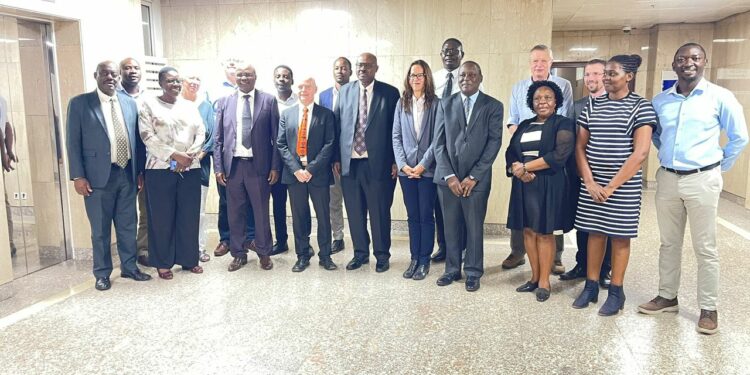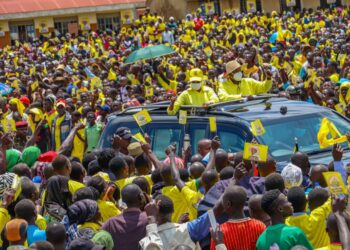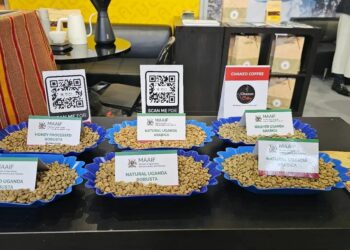The Permanent Secretary Ministry of Local Government, Mr. Ben Kumumanya, says the Rural Development and Food Security in Northern Uganda (RUDSEC) programme holds a high stake in the national development protocol and will not only contribute to rural infrastructure improvement but also strengthen bilateral relations between Uganda and Germany.
He made the remarks on Thursday at the Ministry of Local Government (MoLG) headquarters in Kampala while chairing a RUDSEC progress review meeting with the KfW team and officials from MoLG and Ministry of Works and Transport (MoWT). He also observed that the project has gained visibility two years into its five-year implementation period.
The RUDSEC project is a result of a cooperation agreement between the Ugandan and German governments. The Ministry of Local Government is implementing the EUR28 million (Shs115.3 billion) project with support from the Ministry of Works and Transport on behalf of the government of Uganda. KfW is the implementing partner of Germany’s Federal Ministry for Economic Cooperation and Development (BMZ).
RUDSEC will unlock the agricultural potential and increase the income of smallholder farmers in Northern Uganda. This project will focus on improving road transport and market infrastructure to create better local economic opportunities.
The KfW team, led by Ms Ingrid Hahn, has been in the country visiting project sites in Lira and Dokolo districts in Lango subregion to assess progress and engage the communities and district leadership.
Mr Kumumanya assured the KfW team of his ministry’s commitment to the project. “We will ensure that the project is implemented as planned which will further cement the cooperation between Uganda and Germany, open more partnership opportunities while improving the livelihoods of the people of Northern Uganda,” he said.
The meeting noted the challenges such as the impact of climate change on road infrastructure and the need to design and construct infrastructure with climate change in mind. Some of the proposed roads for rehabilitation such as the Alik–Alengi Road in Dokolo District have been completed submerged as a result of the expansion of Lake Kwania.
Ms Hahn noted that her team was impressed with the involvement of the district local government leadership in the project. “Their involvement as well as the project communities is crucial for a successful implementation. We are glad that they are committed to the project,” she said.
The project areas are considered regional food baskets making roads and markets infrastructure interventions important. “The affected districts provide food not only for the region but neighbouring countries as well but lack the necessary infrastructure, which makes the RUDSEC project a timely intervention,” explained Eng. Paul Mukasa Kasule of the Ministry of Local Government who is also the RUDSEC Project Coordinator.
In the current phase, the RUDSEC project will upgrade or rehabilitate approximately 464km of District Roads and Community Access Roads. Another batch of roads and market infrastructure will also be upgraded or rehabilitated as selected by the nine project district local governments. Detailed designing and Environment Impact Assessments (ESIAs) are currently being carried out by several consulting firms ahead of the start of the construction phase.
The road construction and rehabilitation efforts will benefit nine districts: Lamwo, Pader, Agago, Lira, Dokolo, Oyam, Soroti, Serere, and Kaberamaido.
In addition to the roads, the project will also support the development of key market infrastructure. Markets slated for rehabilitation and improvement include Amach, Minakulu, Katine, Pader Town Council, Aswa, Dokolo, Loro, Dakabela, Abone, Arum, Oliga, Padibe, Oriamo, and Kidetok Mulago.
The RUDSEC Project is expected to directly benefit over 3,000 smallholder farmers by improving their access to markets, reducing transportation costs, and minimizing post-harvest losses. Moreover, the project is projected to create over 1,000 employment opportunities in construction, engineering design, and supervision roles.
The implementation of the project marks a promising step torwards the government’s efforts to promote inclusive rural development, boost regional food security, and improve livelihoods in some of Uganda’s most underserved areas.
Do you have a story in your community or an opinion to share with us: Email us at editorial@watchdoguganda.com














